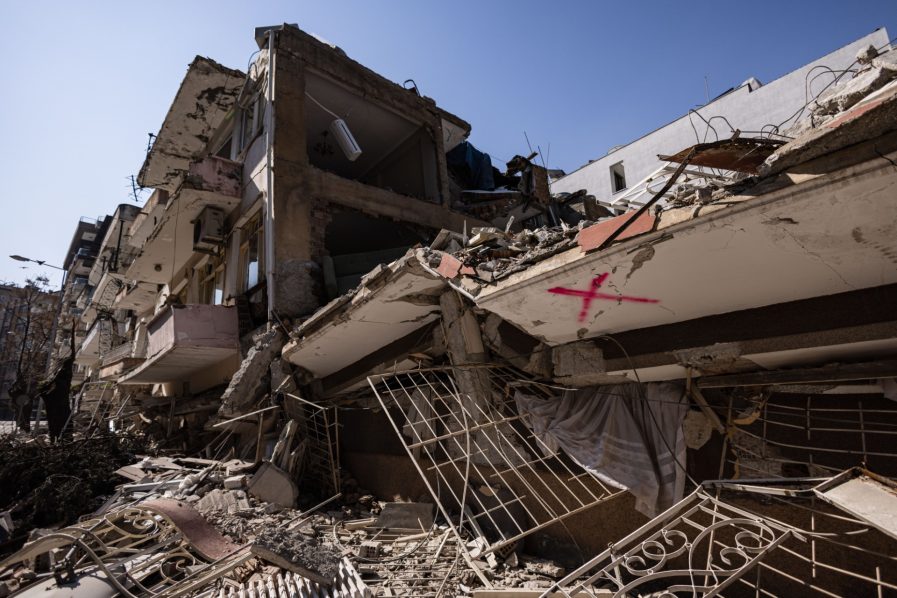By KeneObiezu
This photograph taken on February 18, 2023 shows a sign (X) in read which refers to a buildings that has been already scanned by rescue workers in the city of Antakya. – A 7.8-magnitude earthquake hit near Gaziantep, Turkey, in the early hours of February 6, followed by another 7.5-magnitude tremor just after midday. The quakes caused widespread destruction in southern Turkey and northern Syria and has killed more than 44,000 people. (Photo by Sameer Al-DOUMY / AFP)
SIR: Events from Turkey in the last one week have broken the heart over and over again and laid bare the staggering fragility of the human life before nature’s relentless fury. On February 6, 2022, a devastating earthquake surged through parts of Turkey and Syria tearing down buildings and turning lives upside down. While the whole world has stood behind Turkey and Syria united in grief and solidarity with the country that has quite a large number of refugees, the death toll has continued to climb.
In both countries, more than 40,000 people have been killed and tens of thousands have remained missing even as authorities recently expressed worry that the window of rescue was rapidly closing.
In times like these, people are reminded of the stakes or life and the sometimes very heavy hand that life deals them. People are reminded of the temporality and transience of their lives; people are reminded of the fact that their lives could be extinguished like a flicker in no moment.
In different lives in Nigeria, people are harshly reminded of the precarity of human existence, of how peaceful and harmonious things can appear one minute but completely go off track the next minute.
Families have been torn apart in Turkey and Syria as lives and limbs have been lost to nature’s fury. Many people have also been left homeless. Refugees in both countries as well as migrants have been particularly hard-hit by the tragedy which has trailed them far away from home.
It casts into grim light the preparedness of governments around the world to respond to such unforeseen, unexpected and unfailingly devastating events whenever they occur. Amidst angry allegations that it has not done enough to save lives, the Turkish government has frantically pointed out that no country can ever prepare enough for a disaster of such magnitude. There have also been allegations that poor urban planning aided the fearsome fury of the earthquake as buildings built without sufficient permit stoppled easily trapping many beneath their ruinous rubble. As the dust raised by the tragic earthquake settles, countries around the world can look at themselves and determine how prepared they are to salvage what is left of the lives of their citizens when events like these unfold. Nigeria especially should examine its preparedness for natural disasters. The country has been lucky with natural disasters but there is a strong suspicion that the country is never adequately prepared to handle such disasters. There is ample proof for that too.
With climate change becoming such a critical issue around the world, nature is bound to vent its fury from time to time. It is only prudent that countries should prepare so that when nature comes hunting, not many people will be caught flat-footed.
For each family ripped apart by the ferocious earthquake, the question of how man can live in harmony with nature must assume greater urgency. KeneObiezu. Twitter: @keneobiezu.

